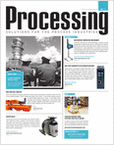Display problem ? Click HERE
After "Concerns & Recommendations on PSV INLET line" is released, a young engineer dropped me a note. The note mentioned he has sized and specified a Pressure Relief Valve (PSV) and selected a PSV inlet line based on inlet line pressure drop less than API RP 520 recommended 3% of set pressure. However, vendor come back the rated flow has increased. The recalculated pressure drop on the PSV inlet line is 5.0% of set pressure which has exceeded the recommended value of 3%. What shall he/she do ? How to resolve issue with PSV inlet line loss exceeded 3% of Set pressure ?
There are few ways to resolve above issue :
Subscribe FREE - Processing Magazine

Why resetting blowdown will allow higher PSV inlet line loss ?
Normal PSV will generally have blowdown at 92%-94% of set pressure. It mean the PSV will reclose at the pressure of 92%-94% of set pressure. With normal API RP 520 recommended maximum inlet line loss (non-recoverable) of 3% of set pressure, the PSV inlet pressure (pressure in protected vessel - non-coverable line loss) will be 97% of set pressure*. This provides margin of about 3%-5% of set pressure.
If the line loss increases to 5%, the PSV inlet pressure would be about 95% of set pressure. Those the margin will drops to 1%-3% which is lower than the recommended margin. In order to regain the 3%-5% of margin, the way is to lower the blowdown to 90%-92% of set pressure. This shall be discussed and confirmed with the PSV manufacturer. One of the disadvantage of lowering blowdown is increases of inventory loss in the event of PSV lifting.
If the increases in inventory loss is found to be excessive and not tolerable, using pilot operated PSV is one of the effective way to solve high inlet line loss problem. Nevertheless, this increase cost. Pilot line can be easily blocked by fluid possibly precipitate/polymerize/crystallize/solidify and defeat the purpose, thus one shall be very careful when select Pilot operated PSV.
If the fluid is possibly precipitate/polymerize/crystallize/solidify, last option is changing the inlet line size.
*Static head has been ignored.
Related Posts
There are few ways to resolve above issue :
- Adjust the selected PSV blowdown (PSV reclose pressure)
- Replace the PSV with pilot operated valve (same size)
- Increase the line size to reduce pressure drop on the inlet line
Subscribe FREE - Processing Magazine

Why resetting blowdown will allow higher PSV inlet line loss ?
Normal PSV will generally have blowdown at 92%-94% of set pressure. It mean the PSV will reclose at the pressure of 92%-94% of set pressure. With normal API RP 520 recommended maximum inlet line loss (non-recoverable) of 3% of set pressure, the PSV inlet pressure (pressure in protected vessel - non-coverable line loss) will be 97% of set pressure*. This provides margin of about 3%-5% of set pressure.
If the line loss increases to 5%, the PSV inlet pressure would be about 95% of set pressure. Those the margin will drops to 1%-3% which is lower than the recommended margin. In order to regain the 3%-5% of margin, the way is to lower the blowdown to 90%-92% of set pressure. This shall be discussed and confirmed with the PSV manufacturer. One of the disadvantage of lowering blowdown is increases of inventory loss in the event of PSV lifting.
If the increases in inventory loss is found to be excessive and not tolerable, using pilot operated PSV is one of the effective way to solve high inlet line loss problem. Nevertheless, this increase cost. Pilot line can be easily blocked by fluid possibly precipitate/polymerize/crystallize/solidify and defeat the purpose, thus one shall be very careful when select Pilot operated PSV.
If the fluid is possibly precipitate/polymerize/crystallize/solidify, last option is changing the inlet line size.
*Static head has been ignored.
Related Posts
- Concerns & Recommendations on PSV INLET line
- Few Concerns & Recommendations of PSV Discharge Tail pipe
- Where to Locate the PSV Inlet Nozzle ?
- Is Single PSV Protection Sufficient ?
- PSV Chaterring is Destructive...The ways to Prevent...
- Relate PSV Relieving Flow to Stamped Capacity
- Thermal Relief of Non-Flashing Liquid in Pipe
No comments:
Post a Comment